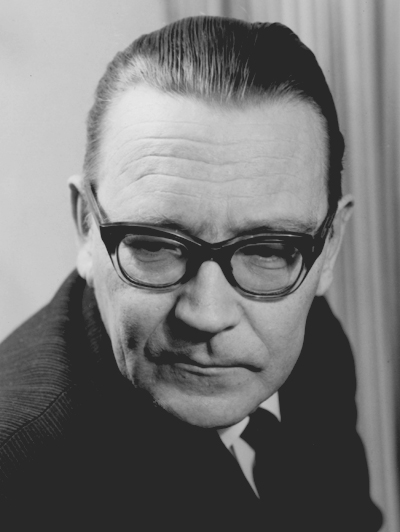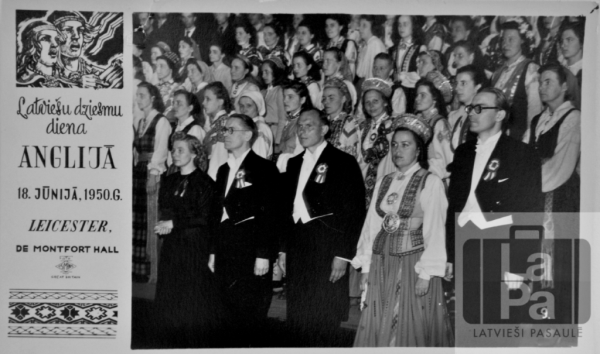Alberts Jērums
1919–1978
Composer, conductor, organist, music critic
Alberts Jerums was born on 1 January 1919 in Estonia, in the Purikas house, a small former half-manor in Karula, Valga County, in the family of Jekabs and Minna. In 1920, with the end of the War of Independence and the beginning of the drawing the borders of the newly established countries, Albert's parents sold Purikas and moved to Latvia, to Skirstnieki house in Lugazi parish near Valka. Coming from a family of music lovers, Alberts did not consider any other profession than music. From an early age, he learned to play the piano and wind instruments.
After graduating from Cimze Gymnasium in Valka, in 1937 he went to Riga where he enrolled in the Latvian Conservatoire's organ and composition theory class under Jazeps Vitols (Jāzeps Vītols). He quickly became the most successful and visible student as well as a personal friend of Vitols. Alongside his studies, he worked as a music critic for the newspapers “Tevija” and “Rits” and obtained a teaching job at the Riga State Music School. In 1942, he completed his studies at the Conservatoire with the first atonal piano sonata in Latvian music as well as cantata “Debesu kalējs” (The Blacksmith of Heaven), a string quartet and a two-movement “Andante” for large orchestra. Jerums married actress Velta Kruze (Velta Krūze), and in 1943 the family grew with the birth of their daughter Inga.
The Second World War interrupted the promising artist's daily life. A mobilisation request separated Jerums from his family in Latvia. In 1944, his war service in northern Germany ended and his exile began. For a while he settled in Detmold (in the hotel “Frische Quelle”), where composer Janis Cirulis (Jānis Cīrulis), pianist Voldemars Melkis (Voldemārs Meļķis), violinist Ferdinands Heinrichsons, singer Elfrida Karlsone-Kukaine (Elfrīda Karlsone-Kukaine, after marriage – Berzina (Bērziņa)), and later Professor Vitols already lived. Jerums composed extensively, taught at the UNRRA Baltic DP Music College, and performed in concerts. In 1947, having lost hope of returning to Latvia, Jerums moved to England. In 1948, he founded the London Latvian Choir, also known as the ‘Jerums Choir’, and directed it until the end of his life. At the same time, he also directed other Latvian and English choirs. In England he started a family with Lauma Grigora, a daughter of the founder of the Christ Lutheran Church in Riga, and in 1953 they had a daughter Jana.
Jerums was the driving force behind the creation of the English Latvian Song Days and was one of the chief conductors at nine Song Days: in 1949 – 1951, 1954, 1958, 1961, 1968, 1971 and 1975. From 1950 onwards he introduced the tradition of creative concerts at Latvian Song Festivals and Song Days around the world, improving the quality of these concerts for them to become outstanding musical events. In the early 1960s he was also one of the initiators of the European Latvian Song Festivals, leading the choir in four of them (in 1964, 1968, 1973, 1977) as well as putting forward the idea of gathering Latvian choirs from all continents for the World Free Latvian Song Days in 1979 on the island of Gotland, Sweden. He was the chief conductor of the Latvian Song Festivals in Canada in 1965, 1970 and 1976. He was also active in several Latvian and British cultural organisations, wrote about music in the press and was a popular member in contest juries and editorial boards.
Jerums passed away five days after his 59th birthday, on 6 January 1978, while still managing to provide framework for the World Free Latvian Song Days in Gotland in June 1979, and event which he himself had initiated. He was buried on 14 January in Brookwood Cemetery, London. In the same year, the Latvian Choirs Association in the USA established the Jerums Memorial Scholarship Fund.
During his lifetime he composed five sonatas for solo instruments with piano, string quartet and other chamber ensembles, works for piano, organ, several orchestral compositions, cantatas, about 40 solo songs, including three cycles, around 40 choral songs and arrangements of folk songs for choir. Some of the choral works were gathered in a collection published in London in 1984.
Information sources
Alberts Jērums. (b.g.). https://www.lmic.lv/lv/komponisti/alberts–jerums–1545#work
Atmiņu pēdās ar Albertu Jērumu. (1981). Latvju Mūzika, 12, 1137.–1164. Latvju Mūzika, Nr.12 (01.01.1981) (periodika.lv)
Jērums, Alberts (1919–1978). (b.g.). https://www.musicabaltica.com/lv/komponisti–un–autori/alberts–jrums/
Znotiņš, A. (2019). Albertam Jērumam – 100. Mūzikas Saule, 2 (98), 4.–11. https://www.lmic.lv/uploads/kcfinder/files/Msaule02LMICatv47.pdf











